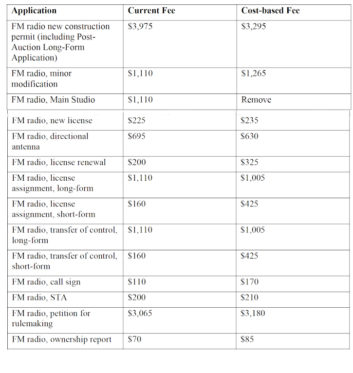
The Federal Communications Commission wants to hear from you on changes it proposes to make to the its application fee schedule, including common applications for FM and AM radio stations.
In a Notice of Proposed Rulemaking released in late August, the commission invited comment. The changes would affect a broad spectrum of filings processed by the commission: applications, modifications/renewals of wireless, television and satellite licenses, applications to participate in auctions, formal complaints and certain petitions.
The actions are designed to simplify and streamline what the FCC calls an overly complex fee schedule.
“This rulemaking provides an opportunity to bring this set of fees into the 21st century by lowering fees to account for processing efficiencies where appropriate, adding new fees for applications that were implemented after the original fee schedule was adopted, and eliminating fees for applications that no longer exist,” the commission said in its notice.
Among the changes, the commission is proposing to streamline its list of application fees by consolidating eight separate categories into these five: Wireless Licensing Fees, Media Licensing Fees, Equipment Approval Fees, Domestic Service Fees and International Service Fees. The commission also proposes to reduce the total number of application fees from 450 to 167 while also including some new fees.
Broadcasters may be pleasantly surprised to learn that the FCC is proposing to reduce a number of application fees for the AM and FM radio service. For each category, the commission offers an explanation of the reasons for the increase of decrease, such as the need for significant legal analysis or substantial engineering review. By estimating the actual direct labor needed to process a typical application, fees will be more closely tied to the actual effort of processing of applications, the FCC said.
For commercial FM stations, the category with the largest drop is the new construction permit, which the commission is proposing to decrease from $3,975 to $3,295 (a drop of $680). Applications with an increase include the FM radio minor modification application (from $1,110 to a proposed fee of $1,265) and the FM license renewal application (from $200 to $325).
The commission plans to outright remove the main studio request application for AM and FM radio. For AM radio, it is also proposing to eliminate the AM remote control application.
The notice of proposed rulemaking also offers changes to the FM translators and boosters application fee, including a proposed reduction in the fee for processing an FM translator new construction permit from $835 to $705. The translator/booster applications with the biggest proposed change include both the FM translator license assignment and the FM translator transfer of control application, both of which the FCC is proposing to raise significantly — from $160 to $290 — due to legal analysis and significant attorney review and supervision.
The notice proposes to continue to exempt the noncommercial educational broadcast service from having to submit these types of application fees.
Among fees for commercial AM radio, the FCC wants to reduce four, raise eight and remove two outright.
The one with the largest drop in commercial AM is — ironically — an application with the highest level of complexity; but it also one the FCC doesn’t see much: an application for a new construction permit. The FCC is proposing to drop that from the current rate of $4,415 to $3,980.
The highest proposed increase in commercial AM is the minor modification application. The FCC is proposing to raise that from $1,110 to $1,625. Other significant jumps include the AM radio directional antenna application, which would increase from $835 to $1,260. Another jump: the short-form AM radio license assignment from $160 to a proposed fee of $425.
Applications with a planned decrease include the long-form AM radio transfer of control application (from $1,110 to $1,005) and an AM radio new license application (from $725 to $645).
In addition to seeking comment on the newly proposed cost-based fees, the FCC wants to hear whether it should further consolidate and streamline proposed fees to ease the burden of administration and simplify compliance.
Comments will be due 30 days after the notice is published in the Federal Register using the FCC’s ECFS database using Docket Number 20-270.






